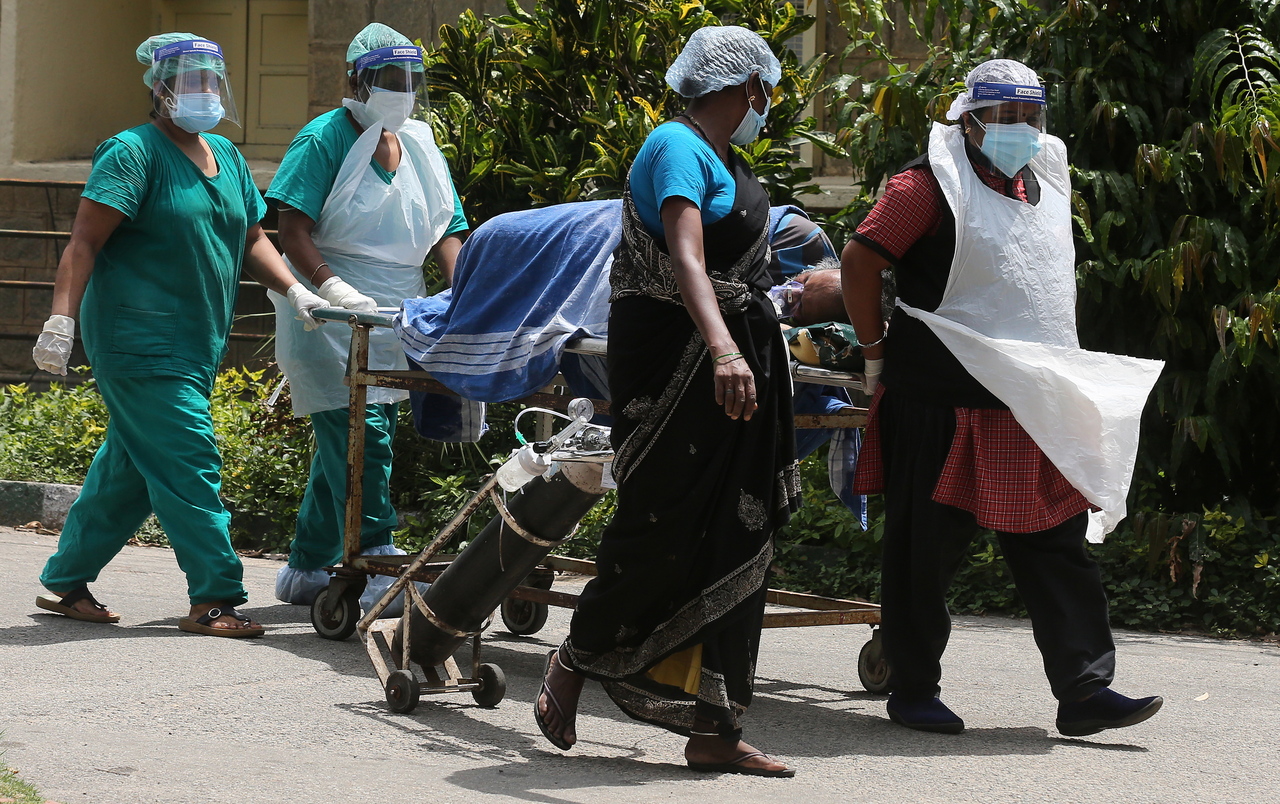India's second Covid-19 wave pushes healthcare workers close to breaking point
Sign up now: Get insights on Asia's fast-moving developments

A suspected Covid-19 patient at KC General hospital in Bangalore on May 24, 2021.
PHOTO: EPA-EFE
Follow topic:
NEW DELHI - Mr Joseph Jennings said the first wave of the coronavirus pandemic had left him physically exhausted.
Then, things got worse.
"The second wave has broken our hearts," added the 35-year-old intensive care unit (ICU) nurse from the southern state of Kerala.
A few days ago, his team had to tell a 15-year-old of his mother's death. The boy and his younger brother were the only ones in their family who tested negative for Covid-19.
"He wanted to see his mother and kiss her one last time. I don't know how we managed that situation. Last week, we had a lady with a six- and a three-year-old. She passed away. Her husband used to come every day. That was emotionally traumatic for me," said Mr Jennings, adding that, like many of his colleagues, he has found it difficult to sleep most nights.
Along with other ICU nurses, he has become witness to last words and caretaker of last wishes.
"The patients all say they want to be with family, they want a peaceful death. One lady begged me to take away the oxygen mask so she could die peacefully," said Mr Jennings.
"After this Covid-19 scenario goes and the world becomes smooth, we will see about the memories."
Healthcare workers are scarred from witnessing multiple deaths and young patients - with no co-morbidities (pre-existing medical conditions) - taking a turn for the worse. They also face extreme anger and see families grieving amid a second wave of Covid-19 infections that has put immeasurable pressure on India's healthcare system.
The country has recorded more than 27 million cases of infection, with the government saying the second wave is now on a "downswing".
The number of new cases has come down from more than 400,000 a day early this month to less than 200,000, even as daily deaths due to the virus have come down from more than 4,000 to less than that figure.
Yet, India's healthcare workers stood as a bulwark against chaos as the system appeared on the verge of collapse.
And their work is not yet done.
Last week, a young doctor tweeted a picture of herself in full protective gear at her hospital. It went viral as the accompanying text expressed the anger and frustration felt by so many.
"I am 24, posted in ICU, with 8-10 new mucormycosis cases daily, heavy viral load, risking our lives to save patients," she tweeted in response to a controversial yoga guru calling conventional medicine "a stupid science".
Mucormycosis is a serious and rare fungal infection that has been observed in Covid-19 patients.

Baba Ramdev, the guru who made the claim, is perceived to be close to the ruling Bharatiya Janata Party (BJP) and has a large following. He apologised for calling medicine a "stupid science" after being asked by Health Minister Harsh Vardhan to withdraw his remarks.
But the Indian Medical Association has asked the government to file a sedition case for other remarks, including his claim that 10,000 doctors have died in spite of being vaccinated against the virus, which have since surfaced.
The Uttarakhand branch of the Indian Medical Association has sued Baba Ramdev for defamation to the tune of 10 billion rupees (S$182.5 million).
Doctors have had to make some tough calls amid the second wave of infections, deciding which patients should receive oxygen at the height of the shortage in end-April and the beginning of May.
"There is a lot of tension. This will have a scarring effect. People are dying in spite of all of our good efforts. Patients come in acute condition. We are not able to save (them all). There is a shortage of drugs. It's a stressful situation. And it definitely makes an impact on our minds. Lots of people are stressed out and burned out," said Dr J.A. Jayalal, president of the Indian Medical Association.
"But this is our calling. We are trying to counsel them. We (doctors) have helplines among ourselves. We are getting calls from junior doctors. Some of them want to go away from the profession," he added.
The Indian Medical Association has said 513 doctors have died of Covid-19 in the crippling second wave of the pandemic that, at its peak, overwhelmed hospitals and kept crematoriums blazing. A total of 748 doctors died in the first wave.
In February, the government said 116 nurses have died, but figures concerning nurse deaths in the second wave have not yet been released.
India actually has a shortage of doctors and nurses.
According to a government report, the doctor to population ratio in India is 1:1,511 against the World Health Organisation norm of 1:1,000, and the nurse to population ratio is 1:670 against the norm of 1:300.
There were more than 1.1 million registered doctors and more than 2.9 million nurses in 2018.
"They are doing six-hour shifts. The number of staff is not enough for the patient load," said Dr Sona P. S, president of the Trained Nurses Association of India, Kerala State Branch. She added that nurses were offered tele-counselling.
"The government has offered professional tele-counselling. But nobody is going for that, we can just share (experiences) among ourselves," said Dr Sona.
Some healthcare workers remain astounded at the sight of their own wards.
"Looking at ghost-like white PPE-clad (personal protective equipment) figures walking around inside Covid units is something that even I feel weirded out by, in spite of being exposed to it for over a year. I can't imagine how it must be for patients for whom this is the first hospital admission," tweeted Dr Dipshikha Ghosh.

